Mobile applications have become integral to our daily lives, and their influence extends to the healthcare sector. In this article, we’ll delve into the realm of mobile applications for healthcare, exploring the ways in which these digital tools are reshaping patient experiences, improving access to information, and revolutionizing the delivery of healthcare services.
READ: Allow Patients to Take Control of The Best Telemed’s Potential
The Rise of Mobile Applications in Healthcare
As smartphones become ubiquitous, leveraging their capabilities to enhance healthcare services has become a logical progression.
Mobile Applications: A Patient-Centric Approach
Empowering Patients Through Information Mobile applications empower patients by providing instant access to health information, medication reminders, and personalized health tracking. This patient-centric approach fosters a more engaged and informed healthcare consumer.
Streamlining Healthcare Processes
Efficiency in Healthcare Delivery Mobile applications streamline healthcare processes for both providers and patients. From appointment scheduling to telemedicine consultations, these apps enhance the efficiency of healthcare delivery.
Key Features of Healthcare Mobile Applications
Personal Health Tracking
Empowering Users to Take Control Health and wellness apps enable users to monitor and track their vital signs, physical activity, and overall well-being. This real-time data empowers individuals to take proactive steps toward a healthier lifestyle.
Medication Management
Timely Reminders for Medication Adherence Mobile applications provide medication reminders, ensuring patients adhere to prescribed regimens. This feature is particularly critical for managing chronic conditions and preventing medication errors.
Telemedicine Services
Access to Virtual Consultations Telemedicine apps connect patients with healthcare professionals through virtual consultations. This feature enhances accessibility to medical advice, particularly for individuals in remote areas or those with limited mobility.
Security and Privacy Considerations
Safeguarding Patient Data
Ensuring Confidentiality in Digital Healthcare Security and privacy are paramount in healthcare mobile applications. Robust encryption and compliance with healthcare data protection regulations are essential to safeguard patient confidentiality and maintain trust.

The Future of Mobile Applications in Healthcare
Integration with Wearable Devices
Seamless Data Integration The integration of mobile applications with wearable devices opens new avenues for continuous health monitoring. From fitness trackers to smartwatches, these devices provide valuable data that can inform healthcare decisions.
Artificial Intelligence in Healthcare Apps
Enhancing Diagnostic Capabilities The integration of artificial intelligence (AI) in healthcare apps holds immense potential. AI can assist in diagnosing medical conditions, analyzing medical images, and personalizing treatment plans based on individual health data.
Overcoming Challenges in Mobile Healthcare
Addressing Connectivity Issues
Ensuring Accessibility in All Settings Challenges such as limited connectivity in certain areas can hinder the effectiveness of healthcare apps. Innovations in offline functionality and improved network infrastructure are essential to address these issues.
User Adoption and Trust
Building Confidence in Digital Healthcare Ensuring user adoption requires building trust in the reliability and security of healthcare apps. Transparent communication about data protection measures and continuous improvement in app usability contribute to user confidence.
READ: Geometry Dash Subzero: Chilling Challenges in the Frosty Expansion
Conclusion
The integration of mobile applications in healthcare represents a significant leap forward in the digitization of the industry. These apps have the potential to enhance patient outcomes, streamline processes, and improve overall healthcare delivery. As technology continues to advance, the future holds exciting possibilities for mobile applications in healthcare, shaping a landscape where digital tools play a central role in ensuring accessible, personalized, and efficient healthcare services for all.





